A revocation of authorization letter is a formal document that is used to withdraw or cancel a previously granted authorization, permission, or consent given to an agent to act on your behalf.
Typically, the author of the letter is the principal – the individual or entity that initially granted the authorization. The letter serves to notify the recipient or third party that the privileges previously granted to the agent are now being revoked and are no longer valid.
This article will provide you with a comprehensive understanding of the concept of revocation of authorization letters. It achieves this by delving into their significance and offering guidance on crafting such a letter.
Significance of Revocation of Authorization Letter
The significance of a revocation of an authorization letter lies in its ability to formalize the withdrawal or cancellation of previously granted permissions or privileges. Revocation is a means for protecting your interests and regaining control of previously delegated actions or decisions. Once the revocation takes effect, the agent no longer holds the authority or access to resources, information, or privileges associated with the authorization. You can use the letter to regain the authority yourself or delegate it to a different agent.
The letter is a formal and legal notification to the recipient or third party of the changes in the authorization status between you and your appointed agent. It serves as a clear record of your intent, the rationale behind the decision, and the specified effective date of the revocation. As a result, the recipient of the letter can make necessary adjustments in their interactions with the agent, ensuring that the agent does not undertake any further actions on your behalf.
Writing a Revocation of Authorization
A revocation of a letter of authority necessitates a professional and formal approach. The structure should prioritize transparency, clearly express the intent, and ensure that the recipient is informed of your decision.
Below are the steps involved in crafting an effective revocation of authorization letter:
Step 1: Address the letter to the recipient
Begin the letter by addressing the recipient formally. Use their full name and contact information and, if applicable, their title and organization. This sets a professional tone, defines a clear communication channel, and ensures the letter reaches the intended recipient. Follow with the date the letter is written and a formal salutation.
Example:
[Recipient’s Name]
[Recipient’s Title]
[Recipient’s Organization]
[Recipient’s Address]
[Date]
Dear [Recipient’s Name],
Step 2: Declare the purpose of the letter
The introduction should clearly and concisely state the purpose of the letter, which is to communicate the revocation of authorization to the recipient or third party. This ensures that the recipient understands the main focus of the communication from the outset. This part should be succinct and only provide an overview of the letter’s content.
Example:
Subject: Revocation of Authorization
I am writing to inform you that the authorization granted to [Recipient’s Name/Organization] on [Date of Original Authorization], as outlined in [Authorization Document/Reference Number], is now being revoked.
Step 3: Explain the revocation
Provide a statement that explicitly clarifies that the authorization is being revoked, and cite the reason for revocation, including the effective date of the revocation and the agent’s identity. The effective date helps the recipient understand the timeline – from initiation to revocation of the authorization. Also, use straightforward language to eliminate ambiguity.
Example:
The authorization granted to [Agent’s name] is being revoked after thorough consultations and dialogues between the parties involved. This revocation will be effective from [Effective Date), after which [Agent’s Name] will not have the authority to perform the functions and responsibilities initially authorized to undertake on my behalf.
Step 4: Mention the agent’s identity and scope of authorization
Specify the identity of the agent (person or entity) to whom you initially granted the authorization. Provide details about the scope of the authorization, including what actions or privileges were granted to the agent or representative. This section provides the recipient with sufficient information to identify the individual or entity being prohibited and the actions they are being barred from undertaking.
Example:
This authorization was initially granted to [Agent’s Name], empowering them to [Specify Scope of Authorization, e.g., access confidential company data, make financial transactions, etc.]. Under this authorization, they were permitted to [outline the specific tasks, duties, or areas of authority].
Step 5: Provide a valid and justifiable rationale for the revocation
Explain the reasons for revoking the authorization. Be clear and concise, and provide a valid justification for the decision. Letters of authority can be revoked for different reasons, including misconduct, legal compliance issues, breach of trust, or security concerns. This helps the recipient understand the context and necessity of the revocation.
Example:
Due to [Provide Reason for Revocation, e.g., changes in company policies, regulatory compliance concerns, etc.], it has become necessary to revoke the previously granted authorization. This decision is meant to protect my interests and facilitate improved task delegation.
Step 6: Specify instructions on actions to be taken by the recipient
Clearly outline any actions or steps that the recipient should take following the revocation. This could include discontinuing specific activities, returning materials, or updating records.
Example:
In light of this revocation, we kindly request that you cease all activities and engagements with [Agent’s Name] that were previously authorized under the aforementioned authorization. Additionally, please direct all communications and forward any relevant materials or data handled by [Agent’s Name] to [Contact Person/Department] by [Specify Deadline].
Step 7: Conclude the letter
Conclude the letter with a professional closing. Express gratitude for their understanding and cooperation. Provide your contact information in case they have any questions or concerns.
Example:
We appreciate your attention to this matter and your understanding of the necessity for this revocation. If you have any questions or require further clarification, please contact me at [Your Contact Information].
Thank you for your cooperation.
Sincerely,
[Your Signature]
[Your Printed Name]
[Your Title]
[Your Organization]
Samples & Templates
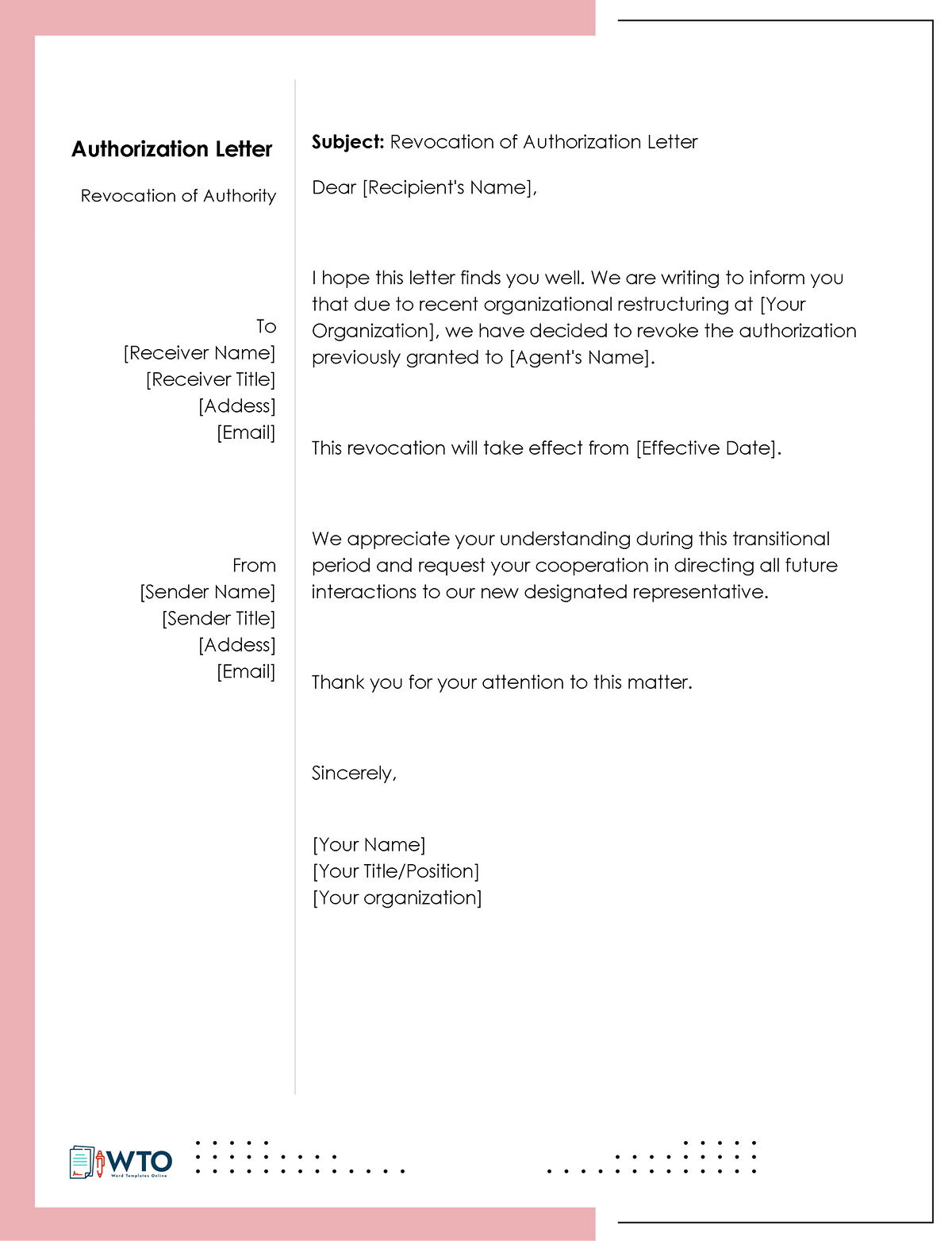
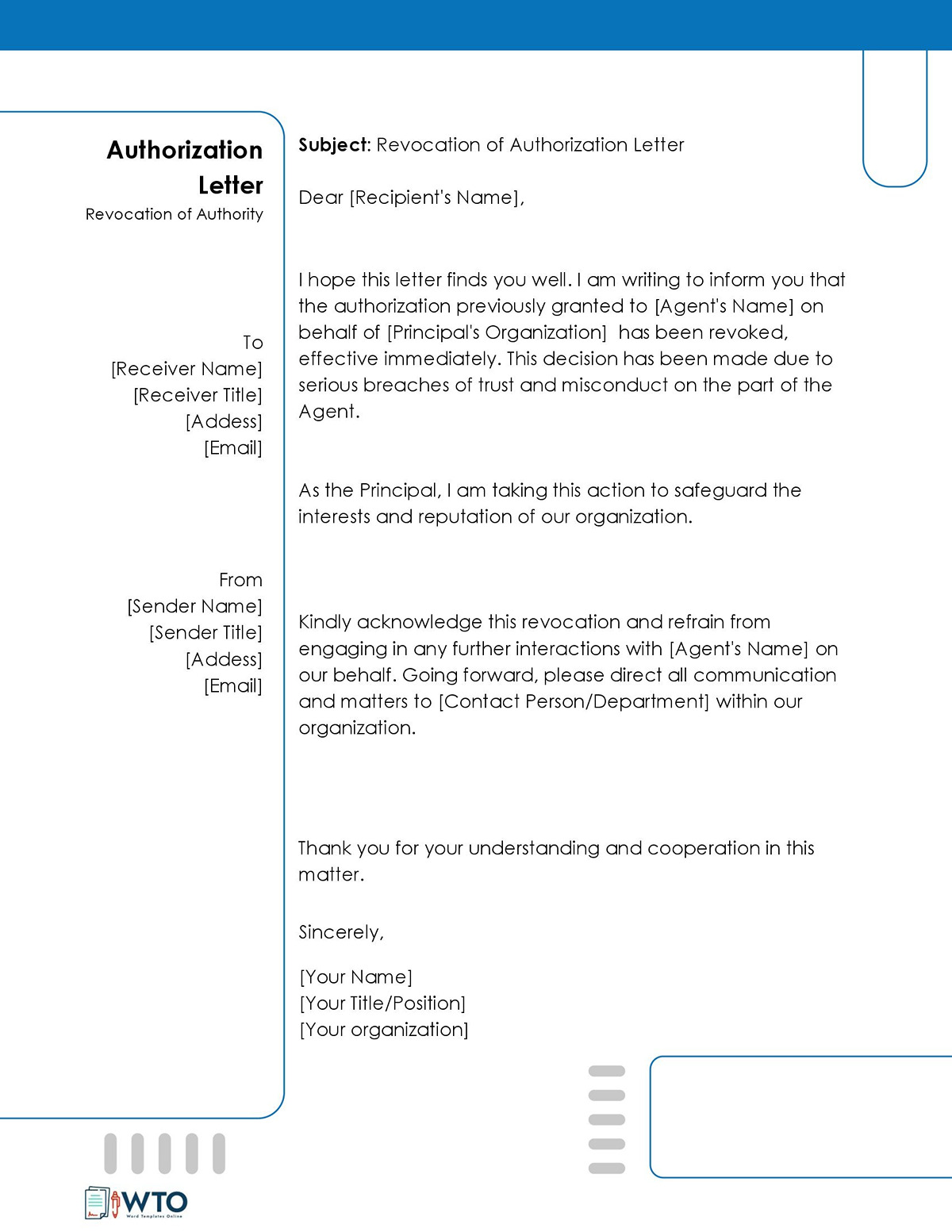

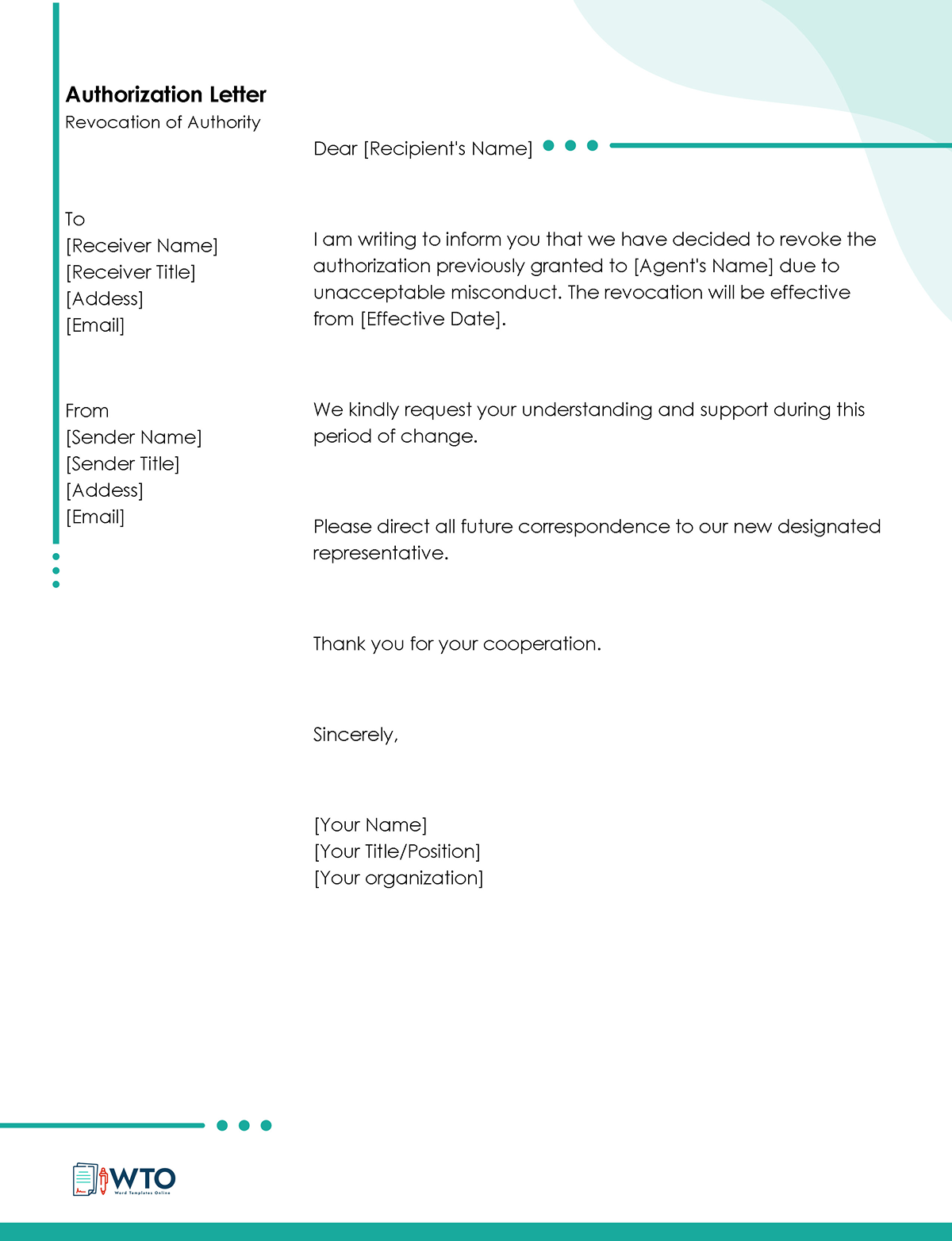
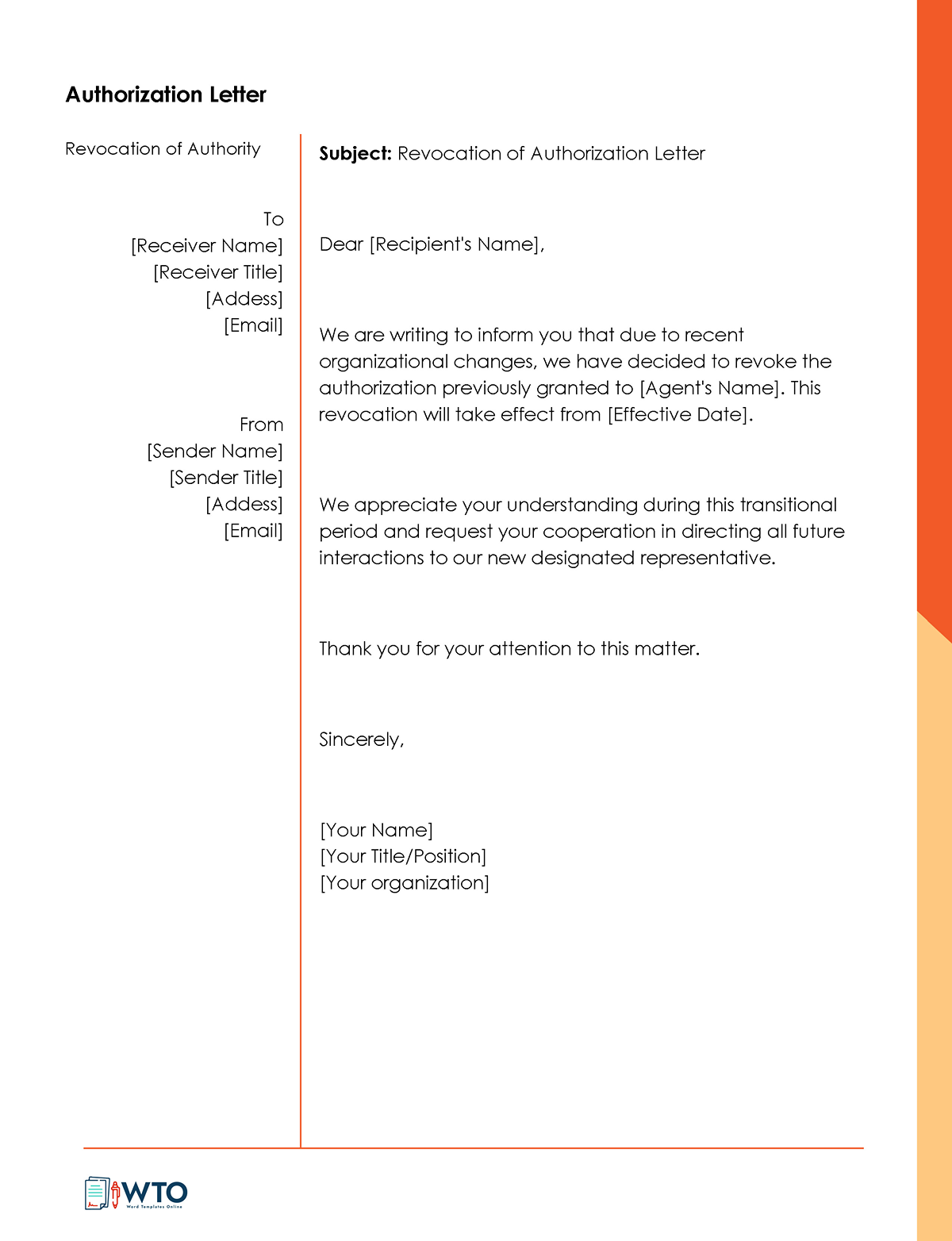
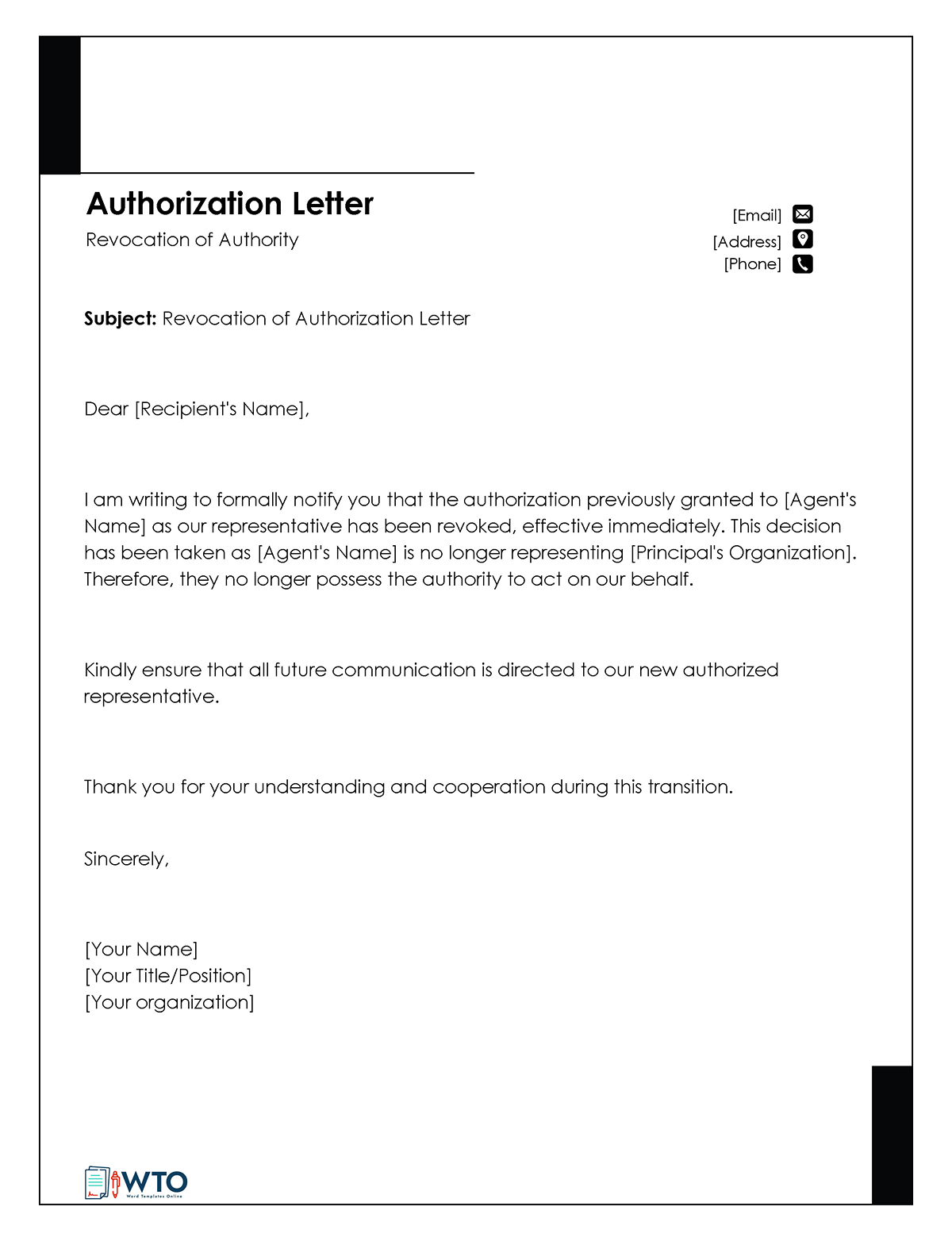
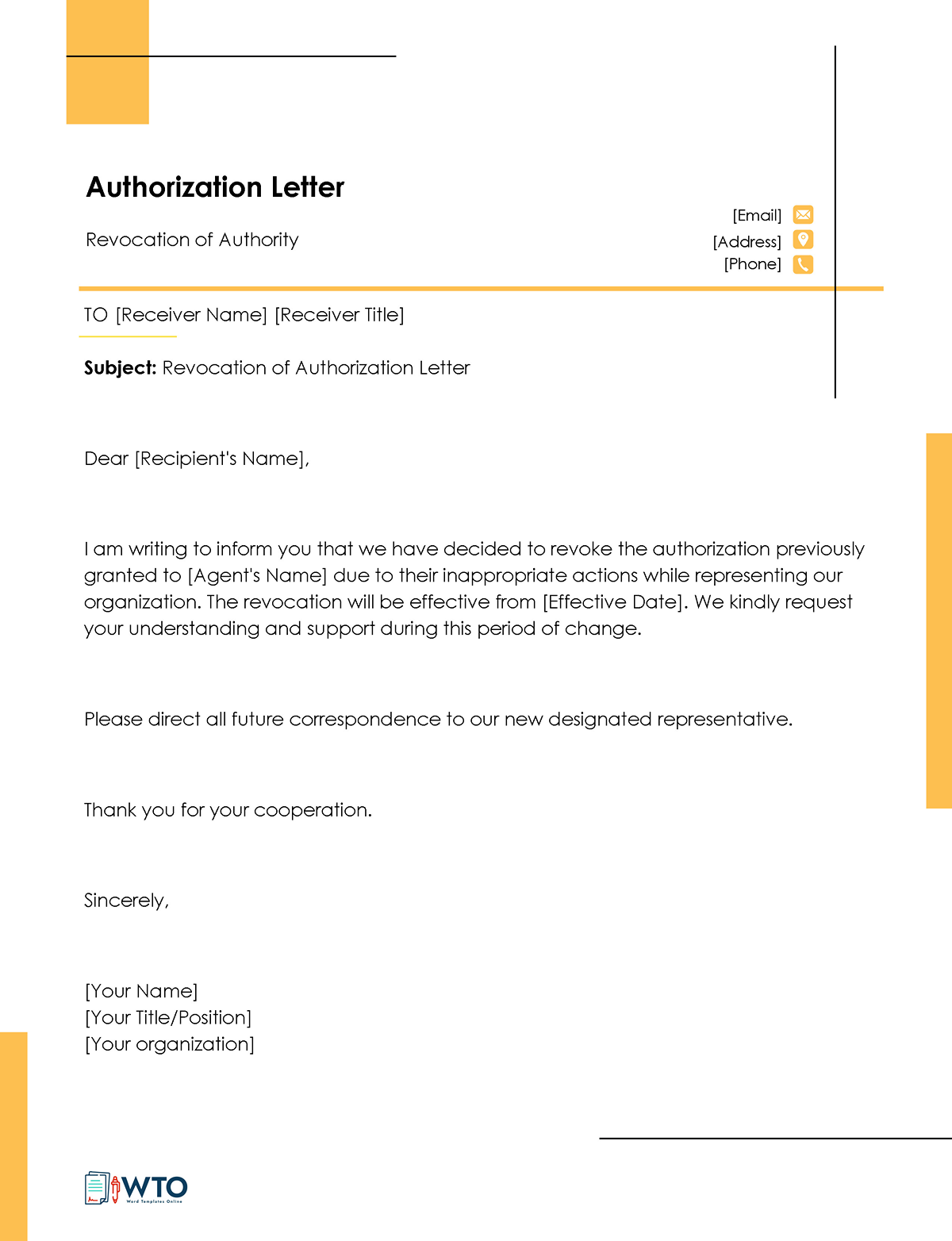
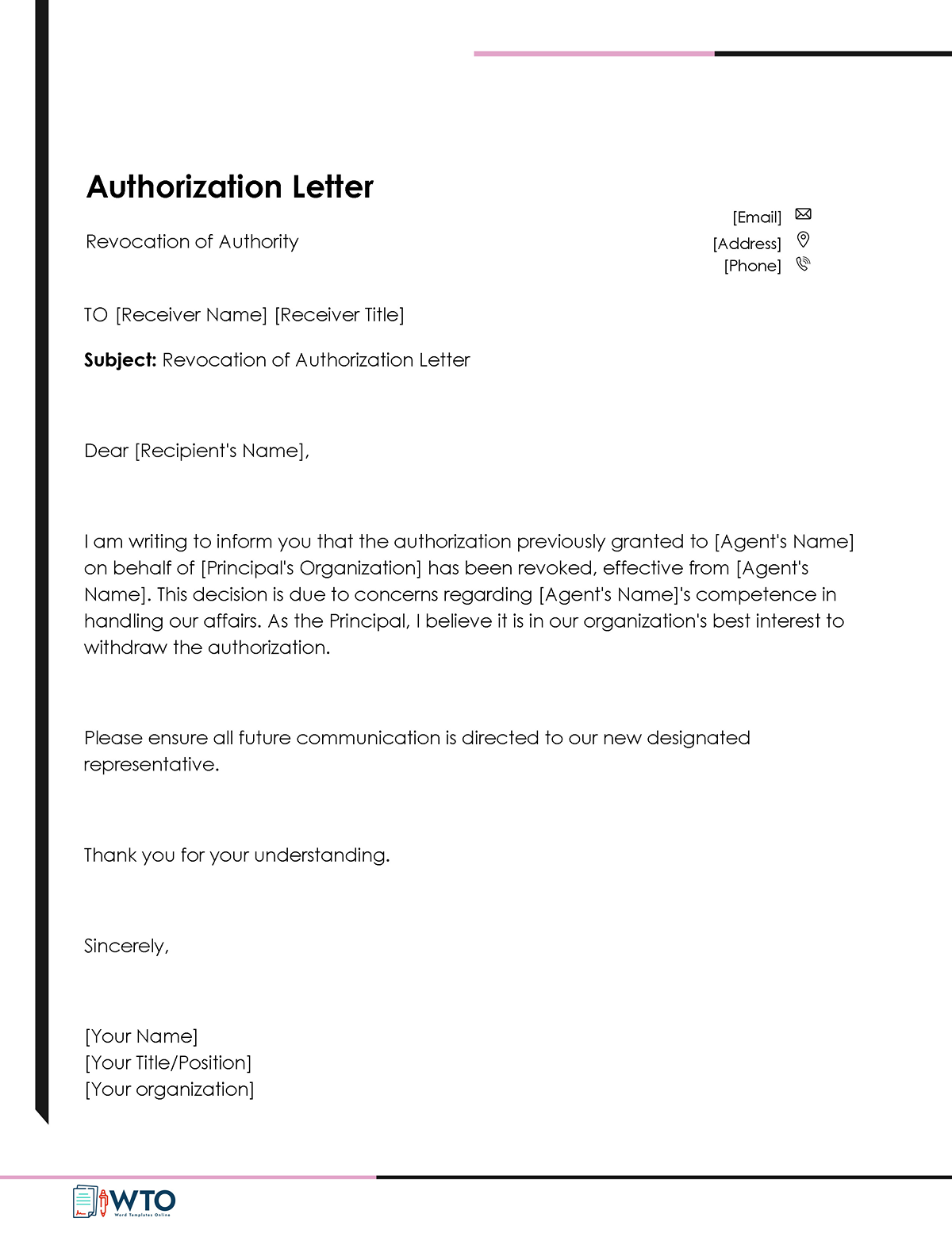
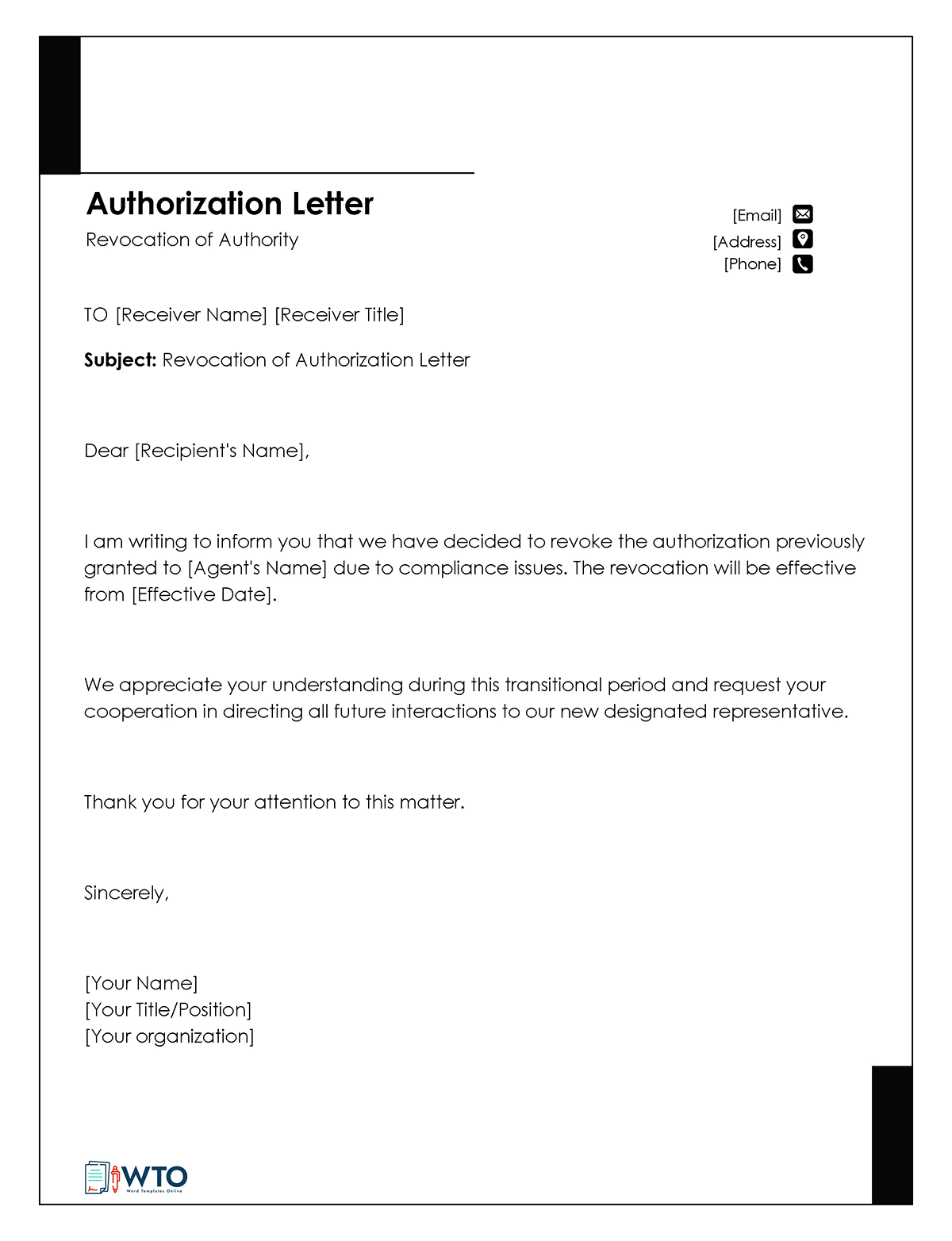
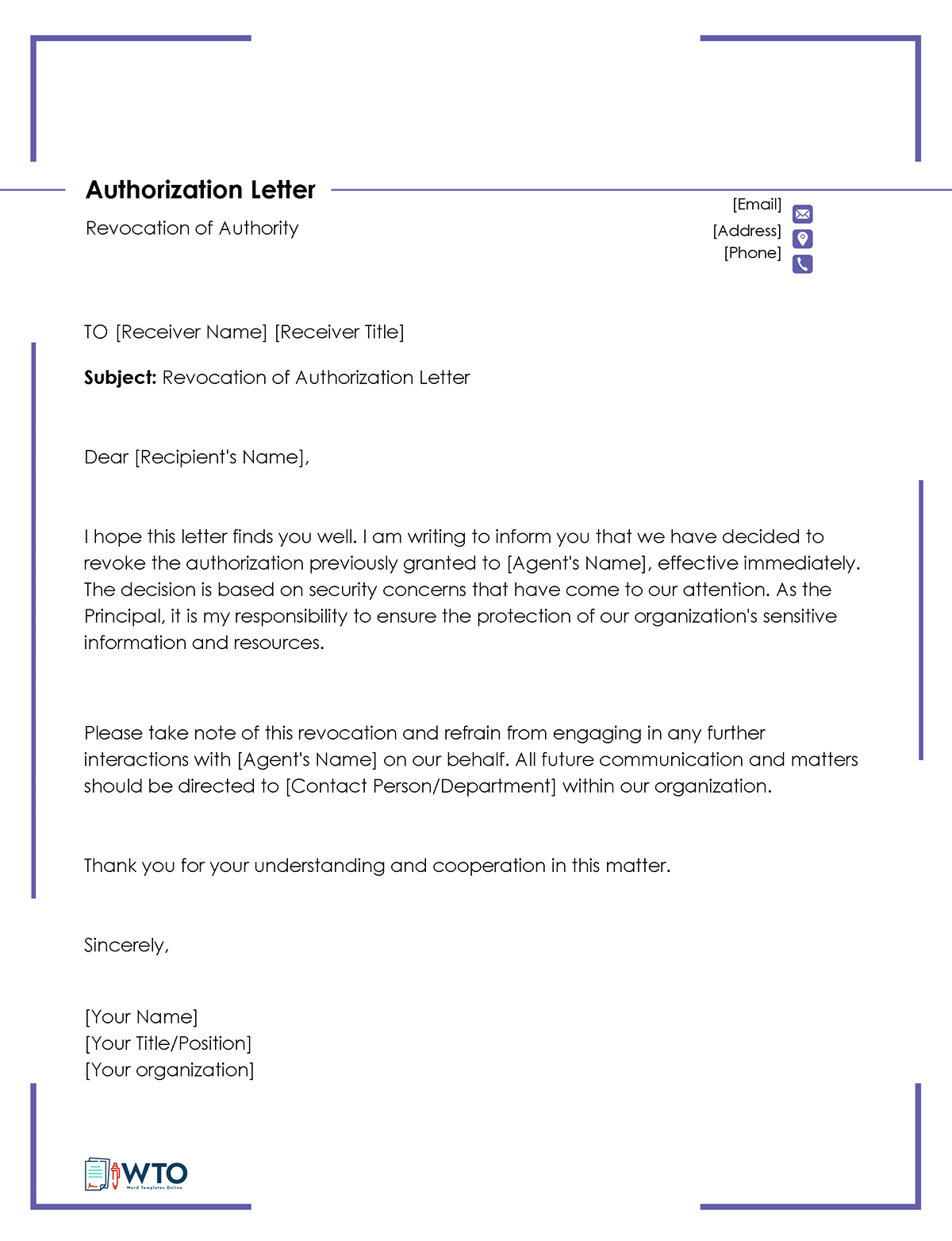
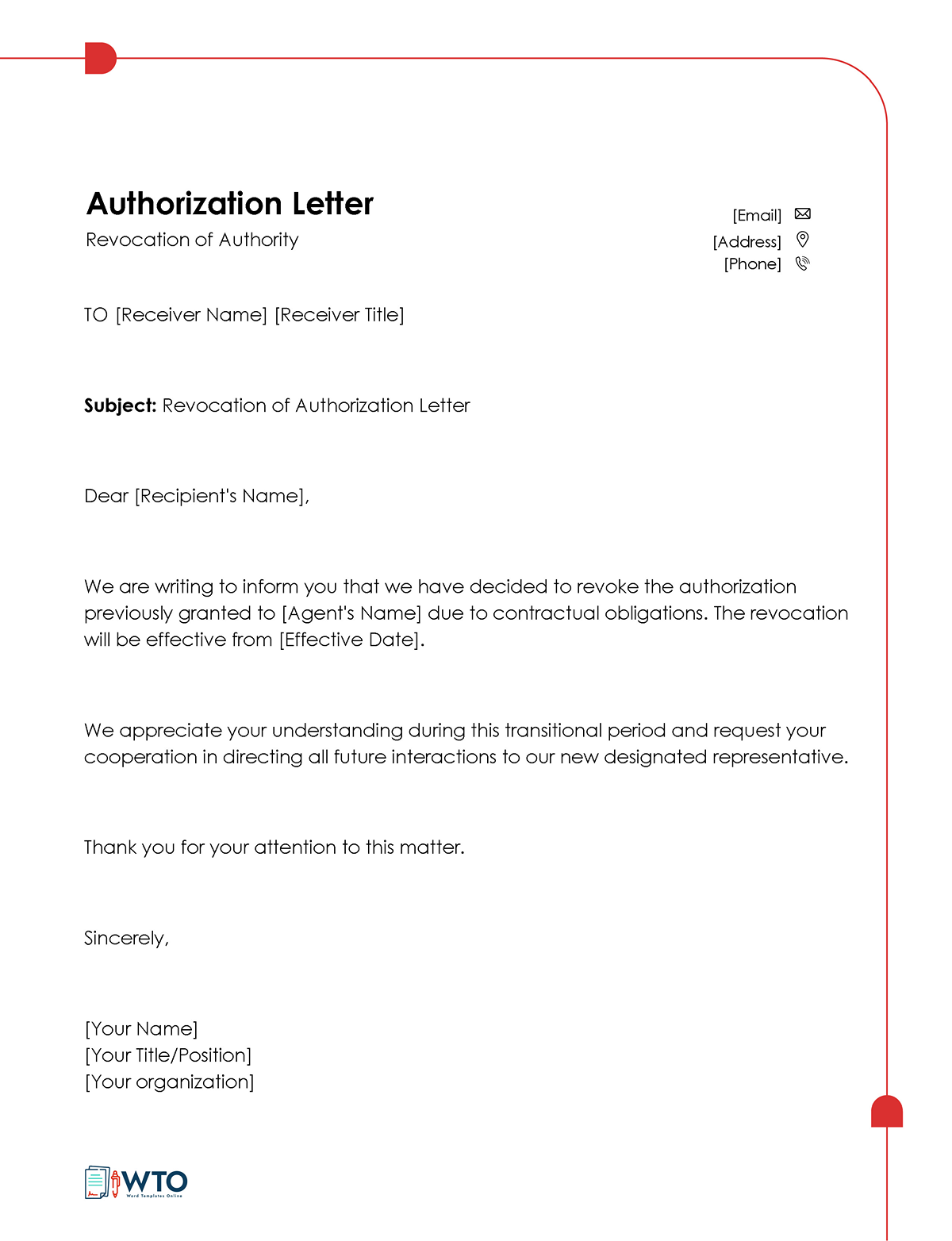
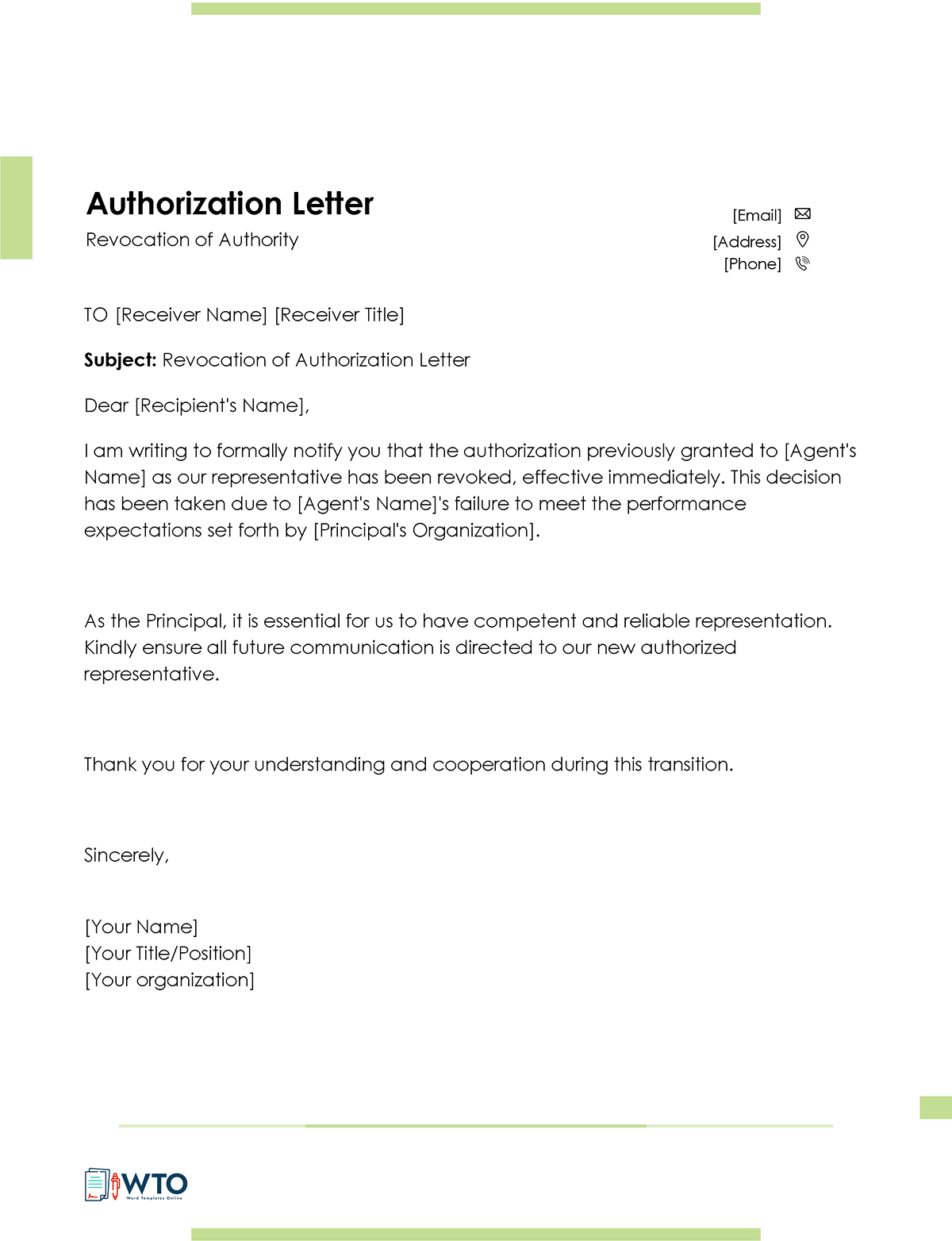
Conclusion
In conclusion, a letter to revoke authority acts as formal communication to inform the recipient or third party of the changes in authorization status. It provides them with a clear record of your intent, reasons, and the effective date of the revocation. This transparency allows them to adjust their interactions accordingly, preventing the agent whose authorization has been revoked from undertaking any further actions on your behalf. Consequently, this asserts your control and safeguards your interests as the principal while protecting any sensitive information and relationships. Additionally, this professional correspondence fosters trust and clarity among all parties involved to mitigate any potential legal and ethical consequences.









